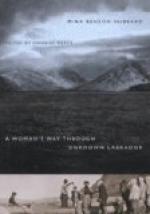Speaking of the loons we had heard calling on Lake Michikamau he said: “You should hear some of the little Indian boys calling the loons. Men’s voices are too strong and rough, but some of those little boys, they can do it very well. You will just see the loons come and circle round and round over them when they call.”
All day long the rain had fallen steadily. I spent most of it in my tent, but the men had been out the whole day and were soaked. Having done their washing on Sunday they had no dry clothes to put on, and so slept wet that night.
CHAPTER XII
THE MIGRATING CARIBOU
Tuesday morning, August 8th, dawned clear and calm, and Gilbert came forth to light the fire, singing: “Glory, glory, hallelujah! as we go marching along.” Yet before the tents were taken down the wind had sprung up from the southwest, and it was with difficulty that the canoes were launched and loaded.
A short distance above our starting-point, we were obliged to run into a sheltered bay, where part of the load was put ashore, and with the canoes thus lightened we crossed to a long, narrow point which reached half-way across from the other side, making an excellent breakwater between the upper and lower parts of the lake. The crossing was accomplished in safety, though it was rough enough to be interesting, and Job and Joe went back for what had been left behind.
The point terminated in a low, pebbly beach, but its banks farther up were ten to twelve feet high, and above it was covered with reindeer moss. Towards the outer end there were thickets of dwarf spruce, and throughout its length scattered trees that had bravely held their heads up in spite of the storms of the dread northern winter. To the south of the point was a beautiful little bay, and at its head a high sand mound which we found to be an Indian burying-place. There were four graves, one large one with three little ones at its foot, each surrounded by a neatly made paling, while a wooden cross, bearing an inscription in Montagnais, was planted at the head of each moss-covered mound. The inscriptions were worn and old except that on one of the little graves. Here the cross was a new one, and the palings freshly made. Some dis-tance out on the point stood a skeleton wigwam carpeted with boughs that were still green, and lying about outside were the fresh cut shavings telling where the Indian had fashioned the new cross and the enclosure about the grave of his little one. Back of this solitary resting-place were the moss-covered hills with their sombre forests, and as we turned from them we looked out over the bay at our feet, the shining waters of the lake, and beyond it to the blue, round-topped hills reaching upward to blend with exquisite harmony into the blue and silver of the great dome that stooped to meet them. Who could doubt that romance and poetry dwell in the heart of the Indian who chose this for the resting-place of his dead.




